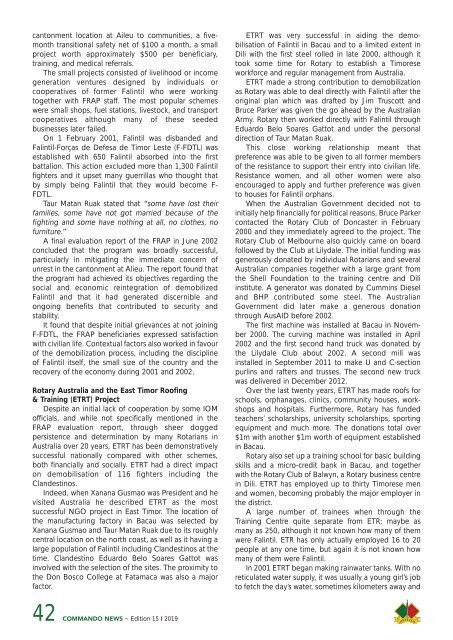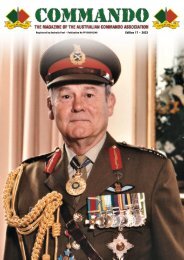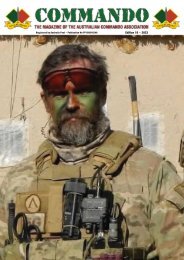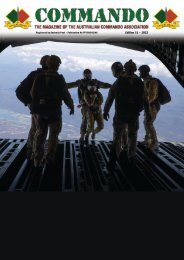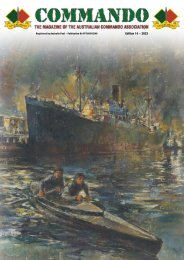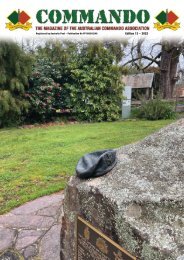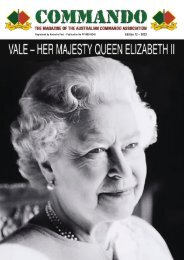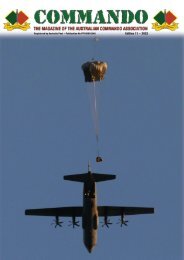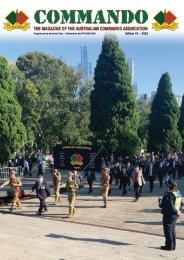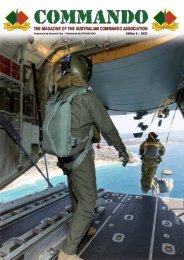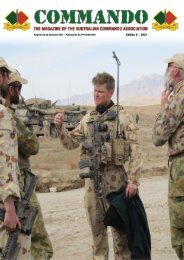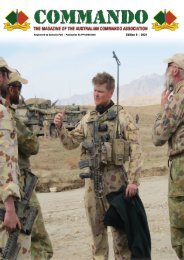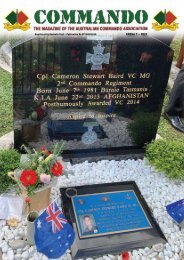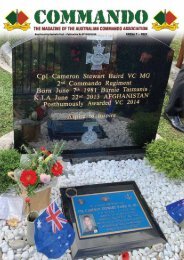Commando News issue 15 2019
The Official Australian Commando News Magazine
The Official Australian Commando News Magazine
You also want an ePaper? Increase the reach of your titles
YUMPU automatically turns print PDFs into web optimized ePapers that Google loves.
cantonment location at Aileu to communities, a fivemonth<br />
transitional safety net of $100 a month, a small<br />
project worth approximately $500 per beneficiary,<br />
training, and medical referrals.<br />
The small projects consisted of livelihood or income<br />
generation ventures designed by individuals or<br />
cooperatives of former Falintil who were working<br />
together with FRAP staff. The most popular schemes<br />
were small shops, fuel stations, livestock, and transport<br />
cooperatives although many of these seeded<br />
businesses later failed.<br />
On 1 February 2001, Falintil was disbanded and<br />
Falintil-Forças de Defesa de Timor Leste (F-FDTL) was<br />
established with 650 Falintil absorbed into the first<br />
battalion. This action excluded more than 1,300 Falintil<br />
fighters and it upset many guerrillas who thought that<br />
by simply being Falintil that they would become F-<br />
FDTL.<br />
Taur Matan Ruak stated that “some have lost their<br />
families, some have not got married because of the<br />
fighting and some have nothing at all, no clothes, no<br />
furniture.”<br />
A final evaluation report of the FRAP in June 2002<br />
concluded that the program was broadly successful,<br />
particularly in mitigating the immediate concern of<br />
unrest in the cantonment at Alieu. The report found that<br />
the program had achieved its objectives regarding the<br />
social and economic reintegration of demobilized<br />
Falintil and that it had generated discernible and<br />
ongoing benefits that contributed to security and<br />
stability.<br />
It found that despite initial grievances at not joining<br />
F-FDTL, the FRAP beneficiaries expressed satisfaction<br />
with civilian life. Contextual factors also worked in favour<br />
of the demobilization process, including the discipline<br />
of Falintil itself, the small size of the country and the<br />
recovery of the economy during 2001 and 2002.<br />
Rotary Australia and the East Timor Roofing<br />
& Training (ETRT) Project<br />
Despite an initial lack of cooperation by some IOM<br />
officials, and while not specifically mentioned in the<br />
FRAP evaluation report, through sheer dogged<br />
persistence and determination by many Rotarians in<br />
Australia over 20 years, ETRT has been demonstratively<br />
successful nationally compared with other schemes,<br />
both financially and socially. ETRT had a direct impact<br />
on demobilisation of 116 fighters including the<br />
Clandestinos.<br />
Indeed, when Xanana Gusmao was President and he<br />
visited Australia he described ETRT as the most<br />
successful NGO project in East Timor. The location of<br />
the manufacturing factory in Bacau was selected by<br />
Xanana Gusmao and Taur Matan Ruak due to its roughly<br />
central location on the north coast, as well as it having a<br />
large population of Falintil including Clandestinos at the<br />
time. Clandestino Eduardo Belo Soares Gattot was<br />
involved with the selection of the sites. The proximity to<br />
the Don Bosco College at Fatamaca was also a major<br />
factor.<br />
ETRT was very successful in aiding the demo -<br />
bilisation of Falintil in Bacau and to a limited extent in<br />
Dili with the first steel rolled in late 2000, although it<br />
took some time for Rotary to establish a Timorese<br />
workforce and regular management from Australia.<br />
ETRT made a strong contribution to demobilization<br />
as Rotary was able to deal directly with Falintil after the<br />
original plan which was drafted by Jim Truscott and<br />
Bruce Parker was given the go ahead by the Australian<br />
Army. Rotary then worked directly with Falintil through<br />
Eduardo Belo Soares Gattot and under the personal<br />
direction of Taur Matan Ruak.<br />
This close working relationship meant that<br />
preference was able to be given to all former members<br />
of the resistance to support their entry into civilian life.<br />
Resistance women, and all other women were also<br />
encouraged to apply and further preference was given<br />
to houses for Falintil orphans.<br />
When the Australian Government decided not to<br />
initially help financially for political reasons, Bruce Parker<br />
contacted the Rotary Club of Doncaster in February<br />
2000 and they immediately agreed to the project. The<br />
Rotary Club of Melbourne also quickly came on board<br />
followed by the Club at Lilydale. The initial funding was<br />
generously donated by individual Rotarians and several<br />
Australian companies together with a large grant from<br />
the Shell Foundation to the training centre and Dili<br />
institute. A generator was donated by Cummins Diesel<br />
and BHP contributed some steel. The Australian<br />
Government did later make a generous donation<br />
through AusAID before 2002.<br />
The first machine was installed at Bacau in Novem -<br />
ber 2000. The curving machine was installed in April<br />
2002 and the first second hand truck was donated by<br />
the Lilydale Club about 2002. A second mill was<br />
installed in September 2011 to make U and C-section<br />
purlins and rafters and trusses. The second new truck<br />
was delivered in December 2012.<br />
Over the last twenty years, ETRT has made roofs for<br />
schools, orphanages, clinics, community houses, work -<br />
shops and hospitals. Furthermore, Rotary has funded<br />
teachers’ scholarships, university scholarships, sporting<br />
equipment and much more. The donations total over<br />
$1m with another $1m worth of equipment established<br />
in Bacau.<br />
Rotary also set up a training school for basic building<br />
skills and a micro-credit bank in Bacau, and together<br />
with the Rotary Club of Balwyn, a Rotary business centre<br />
in Dili. ETRT has employed up to thirty Timorese men<br />
and women, becoming probably the major employer in<br />
the district.<br />
A large number of trainees when through the<br />
Training Centre quite separate from ETR; maybe as<br />
many as 250, although it not known how many of them<br />
were Falintil. ETR has only actually employed 16 to 20<br />
people at any one time, but again it is not known how<br />
many of them were Falintil.<br />
In 2001 ETRT began making rainwater tanks. With no<br />
reticulated water supply, it was usually a young girl’s job<br />
to fetch the day’s water, sometimes kilometers away and<br />
42 COMMANDO NEWS ~ Edition <strong>15</strong> I <strong>2019</strong>


